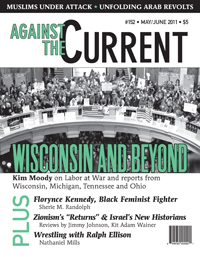Against the Current, No. 152, May/June 2011
-
Budget Woes, Class Wars
— The Editors -
Libya and the Arab Uprisings
— The Editors -
The Unfolding Arab Uprisings
— Suzi Weissman interviews Mark LeVine -
The Attack on American Muslims
— Malik Miah -
An Account from Madison
— Tessa Echeverria and Connor Donegan -
Gutting Cities and Public Education
— Dianne Feeley -
Tennessee: Another Battle Front
— Jase Short -
Ohio Workers, Services Under Fire
— Michael Connery -
Wisconsin and Beyond
— Kim Moody - May Day at 125
-
The Lasting Legacy of Florynce Kennedy, Black Feminist Fighter
— Sherie M. Randolph - Reviews
-
Wrestling with Ralph Ellison
— Nathaniel Mills -
Pappe and Israel's New Historians
— Kit Adam Wainer -
Zionism's Many "Returns"
— Jimmy Johnson -
Why the Revolt in Egypt?
— Dan La Botz -
Workers' Revolts of the 1970s
— Steve Downs -
Assignment 1: LGBT Equality
— Enku MC Ide - In Memoriam
-
Wilebaldo Solano, 1916-2010
— J. Martorell -
Wilebaldo Solano As I Knew Him
— Suzi Weissman -
Margaret Burroughs
— Brian Dolinar -
Julian Mer-Khamis
— The Editors - Dialogue
-
Rebuilding the Antiwar Movement
— Steve Bloom and Dayne Goodwin
IN THE SPRING of 1886 workers at Chicago’s McCormick Harvesting Machine Company struck for the eight-hour workday. They were locked out by the employers, who hired strikebreakers in their place. On May 1 a protest parade was held outside of the plant; two days later police attacked the demonstrators, killing one.
The following day a mass meeting was held at Haymarket Square. Albert Parsons, August Spies and Samuel Fielden, active trade unionists and anarchists, were among the speakers. As the rally was winding down, police dispersed the crowd and a bomb went off. The police opened fire. A total of 11 died, including seven policemen; more than 100 were injured.
The police and media pinned the bombing on the Knights of Labor, which was organizing strikes nationally for the eight-hour day. In the frenzied climate eight labor leaders were arrested as “bomb-throwing anarchists.” Most were also vilified because they were “foreign born.” Although only three had been in the square — and it was never established who threw the bomb — seven were sentenced to death. Four were hanged, a fifth committed suicide in his cell. Before his hanging, August Spies remarked:
“If you think that by hanging us you can stamp out the labor movement… from which the downtrodden millions, the millions who toil in misery and want, expect salvation — if this is your opinion, then hang us! Here you will tread on a spark, but there and there, behind you — and in front of you, and everywhere, flames blaze up. It is a subterranean fire. You cannot put it out.”
The hysteria succeeded in destroying the Knights and setting back the movement for the eight-hour day. In 1893 the anarchists were pardoned by Governor Atgeld.
May Day became a labor holiday around the world, but not much commemorated here. In 2006 immigrant workers “re-imported” May Day and its spirit with mass marches against the Sensenbrenner Bill. That particular bill has gone down to defeat, but the brutal attack on immigrants continues. Today the rights of all working people are under the greatest assault since the 1920s.
ATC 152, May-June 2011

